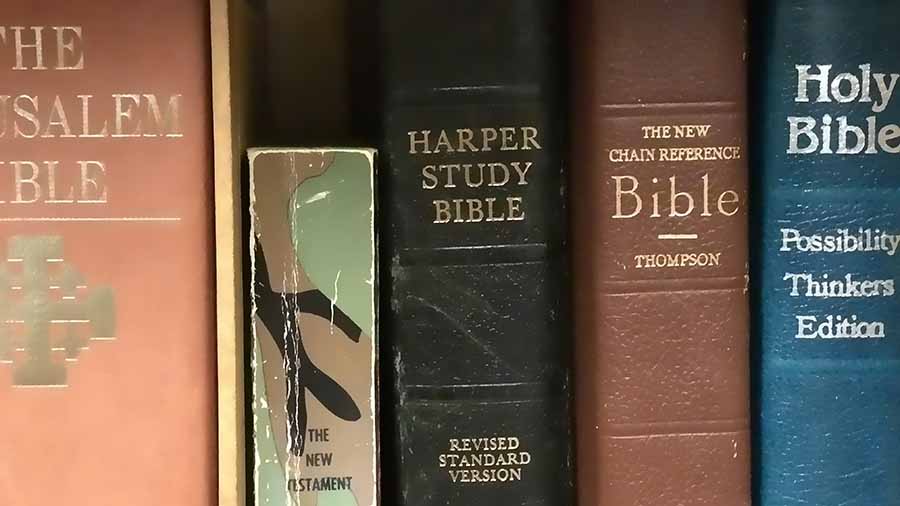This morning I am continuing a short series of sermons on the Word of God. In the Bible the Word of God appears in three forms: 1) The Word of God Spoken, 2) The Word of God Written, and 3) The Word of God Incarnate or Made Flesh in Jesus Christ.
Last week, we talked about the Word of God, spoken, especially as God spoke through the Prophets.
In Genesis 15 we read how “the word of the LORD came to Abram in a vision.” God frequently used visions and dreams, also called,”visions of the night,” to communicate with God’s prophets. At other times, God’s presence was more immediate. In Exodus 33 we read how God spoke to Moses face to face, as a man speaks to his friends. Don’t take this phrase too literally. A little later in the same chapter we are told that God had to hide Moses in the cleft of the rock so that he could see his glory pass by. Sometimes the word of God simply came to the prophet, and there was no explanation of how it came. Thus, in Luke 3 we read how the word of God came to John the son of Zechariah in the wilderness, and the people went out to him to receive a baptism of repentance for the forgiveness of sins. And, in Luke 5 we read how, when Jesus was by Lake Gennesaret, “the people pressed him to hear the Word of God.” Finally, I would mention that, in Philippians 1, St. Paul is grateful that his present imprisonment has served to inspire other preachers “to speak the word of God boldly, without fear.”
It is obvious from all these texts that the Word of God is often the Word of God spoken before it is the Word of God written. It is a contemporary word spoken in a particular time and a particular place to a particular person or a particular people. It is then passed on mouth to mouth until it is written down.
Not everyone recognizes the word of God, spoken or written. Even in the time of Jesus the Jews were divided over the contents of Scripture. On the one hand, the Sadducees accepted as authoritative only the five books of The Law associated with Moses: Genesis, Exodus, Leviticus, Numbers and Deuteronomy. On the other hand, the Pharisees accepted as authoritative not only the Law, but also that section of the Scripture known as “The Prophets,“ which included major prophets like Isaiah and Jeremiah, and minor prophets like Amos, Joel and Obadiah.
Jesus himself sided with the Pharisees, for he spoke of both the Law and the Prophets as authoritative. In Matthew 7 Jesus said, “So whatever you wish that (others) would do to you, do so to them; for this is the law and the prophets.” Jesus accepted other books of the Hebrew Bible as authoritative, too. In Luke 24, just before his ascension into heaven, the Risen Christ instructs his disciples saying, “everything written about me in the law of Moses and the prophets and the psalms must be fulfilled.” Jesus quotes from the Psalms more than any other book. By contrast Jesus did not quote from: Joshua, Judges, Ruth, 1st and 2nd Samuel, 1st Kings, 1st Chronicles, Job, and more than a dozen other books.
Don’t let this trouble you. By the time of Jesus, all the book of our Old Testament were a part of the Scripture recognized by the Pharisees and most other Jews. Indeed, more than l00 years before the birth of Jesus (132 BC) the Hebrew Scripture had been translated into Greek, which was the common tongue of the ancient world. The Greek version of Hebrew Scripture, the Septuagint, was the Bible most often used Jews living outside of their own country, and the Septuagint became the Bible of the the early Church. St. Paul, for example, quotes the text of the Septuagint on a number of occasions. The books of the Septuagint were almost certainly the Scripture that the author of 2nd Timothy 3:16-17 had in mind when he wrote:
All scripture is inspired by God and profitable for teaching, for reproof, for correction, and for training in righteousness, that the (people) of God may be complete, equipped for every good work.
But let us return to our original point. On many occasions, the Word of God was first spoken by God’s prophet, and then, after a lapse in time, sometimes a generation or more, it was written down, and once written down it was eventually recognized as Scripture.
Why the delay? There are a number of reasons, and I would mention two.
First, when you are caught up in some marvelous act of God, you don’t always take the time to write about what you are experiencing until after the initial mystery begins to wear off.
That is o.k. because in the time of Moses, and long after, people were still an oral culture, and they relied on their memories much more than we do today.
I think that Martin Buber was exactly right when he said that God gave us the Ten Commandments and ten fingers, so that we could use our fingers to remember the commandments. The prophets used other memory aids, too. Thus in Deuteronomy 11:18 Moses told the people to lay up the words given by God in their heart, and in their soul, and to bind them as a sign upon their hand, and to wear them as frontlets between their eyes, meaning. In other words, the people were told to memorize the Word of God, and make uses of memory aids to help them do it. Likewise, the special holy days set down in the Law helped the people to remember God’s graciously dealings with them. Thus the people of Israel ate the Passover supper standing, with their shoes on their feet, and their staff in their hands, and they ate it quickly. And when they did, they remembered how the Angel of Death saw the blood of the lamb they had put on their door post and passed over their first born at the very time the first born of the Egyptians sickened and died. In the New Testament, on the night when he was betrayed, the Lord Jesus took bread, and when he had blessed it, he broke it and gave it to his disciples saying, “This is my body which is given for you.This do, in remembrance of me.” And after supper, the cup, in the same way, saying, “This cup is the new covenant in my blood which is shed for you and for many, for the forgiveness of sin. This do, as often as you drink it, in remembrance of me.” The parallels are obvious. The passover reminds Jews how God sent Mose to deliver them from slavery; the Holy Communion reminds Christians how God sent Jesus to deliver the world from slavery to sin and death.
Second, in the case of Jesus and the gospels, the Word of God was not at first written down because the people were looking forward not backward.
For instance, it is obvious from Paul’s letters that the apostle was not primarily concerned with what Jesus was like in the days of his flesh; he was much more concerned with the Risen Christ who would soon come on the wings of the morning to reveal himself in all his power and glory. Thus, in 1st Thessalonians 4, St. Paul wrote that the same Christ who has ascended into heaven was coming back, soon, and when he came back the dead would be raised, and those who were still alive would be marvelously changed, and together, we would be caught up to Christ, to live forever with him.
What was true of Paul was true of all that first generation of Christians. They looked forward not backward. They lived from the future that was coming to them in Jesus Christ.
Of course, this did not stop people from wondering about what Jesus was like, and the original witnesses, like Peter, and the other apostles, prophets, evangelists and pastor-teachers were eager to tell them what Jesus had said and done. They told stories about what Jesus said. Thus we know that, like Moses before him, Jesus summed up all the law and the prophets with two commandments: 1) Love God with all your heart, mind, soul, and strength, (Deut. 6:4) and 2) Love your neighbor as yourself. (Leviticus 19:18) And we know that, unlike Moses, Jesus declared all foods clean, even the bacon and shrimp we ate from the food trucks at the Farmer’s Market. “For,” as he said, “It is what comes out of the mouth, not what goes into the mouth, that makes a person unclean.” (Matthew 15:11) They also told stories about what Jesus did. They told stories about his birth, his boyhood, and his baptism in the River Jordan by his cousin, John. They told about Jesus casting out evil spirits and healing the sick. They told about how Jesus calmed the wind and stilled the storm. They told how Jesus had raised the dead, and how Jesus had predicted his own death and resurrection. Those stories were told and retold by everyone.
Then something happened. The first generation of witnesses started to die out, and Jesus had still not come back. As the disciples passed from this life one by one, the people started asking for the stories about Jesus to be written down. Writing in the middle of the 2nd Christian century, a key figure in the early church named Papias told how a follower of Peter named John Mark wrote down what the Apostle Peter used to teach about Jesus. Papias tells us two very important things. First, he says that Mark did not write in chronological order, meaning that those people who worry about how the order of things differ in the different gospels worry needlessly. And, second, he tells us that John Mark was careful to write down only what Peter actually said about Jesus, adding nothing to it, and leaving nothing out. Papias wanted us to trust Mark’s gospel to be a faithful record of the oral tradition, for he himself he most certainly did.
Think about the gospels that we take for granted. Today, almost every scholar on the planet believes that Mark was the first gospel to be written down. For it is obvious from a careful reading of the gospels that both Matthew and Luke follow Mark, not just thought for thought; but, often, word for word, and when one departs from Mark, the other almost always continues to follow it. Matthew and Luke contain other material in common, too. Scholars have pulled from Matthew and Luke a long list of 114 common sayings. They think these saying may have come from a written source, and they have called it, “Q.” Q stands for the German word, Quelle, which in English means, “source.” The great Scottish New Testament scholar, William Barclay, said he thought that the disciple Matthew may have been responsible for the original version of the source document, and that is why the early church seemed to regarded the gospel of Matthew as older than the gospel of Mark. Of course, Matthew and Luke did not just copy what others had written. They also told stories that were unique to each alone. Thus Matthew preserves for us things like the Parable of the Sheep and Goats, and the long sermon we call, “The Sermon on the Mount.” Likewise, Luke preserves things like the Parable of the Prodigal Son, and the Parable of the Good Samaritan. Matthew, Mark, and Luke are called the Synoptic Gospels, for they seem to see with “a single eye.” John, the fourth gospel is different. In the synoptic gospels, Jesus uses short pithy sayings. In John’s gospel, Jesus is given to long monologues that sound a lot like sermons. One church father explains the difference, saying that what Matthew, Mark and Luke saw as “points of light,” John saw as “blazing suns.” This may be. Tradition says that John lived to a ripe old age, and was was the last of the disciples to die, probably around 96 .A.D. John certainly had longer to reflect on the meaning of what Jesus said and did, and on who Jesus was, than did Matthew, Mark, or Luke.
Anyway, as the first generation of witnesses started to die out, the gospels were written down. They were written down in one community, then circulated among the churches, one by one. In those days, copies of scrolls and books were still exceedingly rare and precious. Soon the communities that received a copy of one of the gospels treated it with the same reverence and care they gave the scrolls of Isaiah or Jeremiah. The churches did the same thing with letters from Paul, and some of the other apostles. Thus, in 2nd Peter we read that Paul’s letters are already being treated as scripture, “though there are some things in them that are hard to understand.” (2nd Peter 3:16)
So, over time, the Word of God spoken, became the Word of God written. And this writing was done by hand, line by line, precept by precept. Given that the work of copying was tedious, it is not surprising that these individual copies of the books of the New Testament differ from one another. The truth is that we possess more than 1,000 manuscripts of books and fragments of books in the New Testament, and there are more variations in these manuscripts than there are words in the text of the New Testament as a whole. Don’t let this worry you. One of my teachers, Bruce Metzger, was the greatest text critic of the 20th Century. The journalist Lee Strobell asked Dr. Metzger what effect the all those thousands of variations had on our understanding of faith. Metzger said all the variations did not affect in the slightest even a single important Christian doctrine. That is pretty amazing, and it gives us an idea how God works, for it serves notice that God is much more concerned with powerful, life creating, world changing ideas than with words on a page. People who get hung up on the words muddle through life always defending this and that. People who open themselves to the ideas contained in the words Master through life, for they learn through practice the truth contained in them. Remember, we do not use ideas; ideas use us. And that, I think, sets the table for the third sermon in this series,”The Word of God Made Flesh.”
We will talk about that next time. In the meantime, let me make a suggestion. Don’t just boast to your friends how much you revere the Bible. Take your Bible off the shelf, dust it off, and spend a little time with it. One hymnist calls the Bible “the golden casket in which gems of truth are stored.” Anybody can spot a ruby or a diamond in a pile, but Jesus said you have to search for the pearl of great price. And, of course, Jesus Christ himself is the most precious jewel of all. In Acts 4:11 the apostle says that he was the stone the builders rejected that has become the cornerstone of God’s whole plan of salvation. When we go to our Bibles, like the very first Christians, we want to learn more of him. He is there, in the words and between the pages, ready to meet us. In his book, The Word Made Flesh, the United Methodist missionary and evangelists E. Stanley Jones includes a picture of the entire text of the New Testament written on a single page. Each word is shaded light and dark so that, as you look at the words, a picture of the Living Word, Jesus Christ forms before your eyes. I believe beyond a shadow of doubt that the infallible task that God has appointed for the scripture is to reveal Jesus Christ to people who hunger and thirst after Him. If the Bible does that for you, you will know the Bible’s truth and value in and of yourself, and you will not worry about defending it to yourself or to anyone else.
Finis
Worth Green, Th.M., D.Min.









